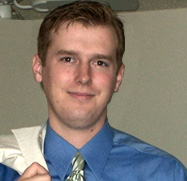
My transition out of the military was a little rough due to the economy and job market at the time of my departure. I was stationed at Ft. Carson, Colorado, and separated in March 2006. There were a lot of soldiers getting out of the military in Colorado Springs, so jobs for ex-soldiers were scarce. I had 23 days of terminal leave saved up, and it ended up being about 30 days after I left the military that I was hired by my first civilian employer through Orion Talent, although I didn't start my job for another six weeks. The job required a move all the way to Iowa from Colorado.
I had a five-month-old son at the time of my separation from the Army, and money was definitely tight. It was really strange not going to formations and PT and everything that I had done every day for the last four years. I had just gotten back from my second tour in Iraq, too. It was hard enough transitioning from combat zone to home, but, on top of that, I was transitioning into the civilian work force.
I knew I had to do something with my life other than being a soldier. I thought about my son growing up while I was off in some other country fighting. But, at the same time, I didn't have a lot of experience outside of the military. I was only 19 when I joined. Four years later when I was getting out, I had no further education or experience other than my Army training.
The easiest part of the transition was spending more time with my family. After two deployments and working long hours in the field, it was a welcome change. The hardest part was dropping the whole soldier mentality. I have held onto a lot of my military training, but I had to drop some of it at the same time. There is no one to tell you what to do, and, as much as I disliked it while I was in the service, it took some getting used to when I no longer had that kind of instruction.
My first job was in the logistics and distribution field in Iowa. After about 14 months, I was promoted and moved to Stockton, California, to be the 2nd Shift Shipping/Receiving Supervisor. I started my career with my employer as a trainee, and, after about six months of learning everything that I could about the business, they started giving me more and more responsibilities. I was in charge of several small projects, and I filled in for other members of management when they were sick or on vacation. It was a great opportunity to learn many aspects of our business for many perspectives.
I was in charge of order picking after about a year in Iowa when I was contacted by another facility manager in our company. He offered me a 3rd shift manager position in California. After the distribution center in California opened, it became apparent that the economy did not require that we work three shifts, so I was offered a position as the Shipping and Receiving Supervisor on second shift at the same pay rate.
My time in the civilian workplace has taught me to step up and make more decisions on my own. In the Army, there was always someone telling you exactly how something should be done. During my first job out, I find myself often explaining to my boss what works and what doesn't. I have written many pages in our SOP (standard operating procedure). In the Army, the SOP was not a living document. You just did as you were instructed.
Unfortunately, in May 2010, I was laid off after four years of employment due to a reduction of redundant management positions. I then worked for an awning manufacturer for about six months as their Warehouse Manager before returning to Colorado Springs to work for a plumbing supply distributor as their Inventory Control Specialist in July 2011. I am still in this position.
My being hired into this position was heavily influenced by my military experience. The founder of the company is a WWII veteran and his son, the current owner, has a lot of respect for veterans. My military experience combined with my management experience equated to over 10 years of management experience. At my age, that put me ahead of quite a few others!
The drive and ability to make things happen and motivate employees to perform (both skills I learned from my time in the Army) have really put me ahead of others in the work place. It was drilled into my head as a soldier to never accept failure as a viable option and to train and prepare for the worst situation. Those skills become very useful in a fast paced work environment.
In my experience, one thing that is important to do as you transition out of the military is sell yourself well. You have more skills than you realize. When you interview, cite specific examples and situations and use terminology that someone off the street would understand. A lot can be lost in translation if you speak in military lingo. Don't be afraid to talk yourself up, because no one else will.


















